Catamaran
The first night sail on board a catamaran
The first piece of good news: if you are apprehensive about your first night passage, it is quite natural and you are not an exception. The second: with a bit of training, a few tips and tricks of the trade, and finally a pinch of organisation, you will easily cope with this 'must' in the career of any self-respecting sailor. Even better, you even risk getting a taste for it and wanting more!
Let's call them Lucy and Jo. Delayed by a few preparation problems, they have to catch up the lost time and meet up with friends who are waiting for them in Madeira. But what are they doing? The weather forecast is good. Why are they stopping in almost every port on the Spanish coast? Back from two years around the Atlantic, they admit it openly and even laugh about it: they had never sailed at night. And they quite simply didn't feel capable of it. Until the day when the friends in question gave them a gentle telling off over the phone, saying that they weren't going to wait all autumn. So they had to make up their minds to lengthen the stages, point the bows of their beautiful catamaran directly towards Gibraltar, and face their first night at sea.
This is a natural apprehension at the start. In our society, fear of the dark is anchored in the collective imagination. And it's nothing new. In Greek mythology, wasn't Night the sister of Darkness and the daughter of Chaos? Sends a shiver down the spine, doesn't it? If you add that as the human eye is extremely sensitive, it makes vision one of most effective senses, and you are seriously inconvenienced when night falls. What's more, as the town or city dwellers that most of us are, living 24 hours a day in an artificially lit world, real, complete darkness becomes synonymous with a loss of references. Human beings are diurnal animals, and the night is experienced as a break. In our childlike mind, when everything disappears from our field of vision, everything dies. It is this ultimate anxiety which is at the heart of our fear of the dark. Add an unusual environment which moves, changes and is unknown, and it's no surprise that spending a night at sea worries a lot of sailors.
Seeing at night. This may appear antinomic, yet it is the key. Fortunately, nature has given human beings lots of resources. Outside your proud multihull, the sources of light are finally numerous: moon, stars, navigation lights, instruments… Unless you are sailing on a moonless night with a thick cloud cover, once your eyes are used to the darkness, you will be surprised by what you can make out. You will realise even better when you return inside. In the shelter of the coachroof and smoked perspex, the night catches up with you. So, to avoid spilling the thermos of coffee on the chart table, or missing a step when answering a pressing need, a minimum amount of lighting will be necessary. Referring to our biology notes, we opt for a few sources of red light in strategic places. In fact it is the rods in our retinas which are ...
Let's call them Lucy and Jo. Delayed by a few preparation problems, they have to catch up the lost time and meet up with friends who are waiting for them in Madeira. But what are they doing? The weather forecast is good. Why are they stopping in almost every port on the Spanish coast? Back from two years around the Atlantic, they admit it openly and even laugh about it: they had never sailed at night. And they quite simply didn't feel capable of it. Until the day when the friends in question gave them a gentle telling off over the phone, saying that they weren't going to wait all autumn. So they had to make up their minds to lengthen the stages, point the bows of their beautiful catamaran directly towards Gibraltar, and face their first night at sea.
This is a natural apprehension at the start. In our society, fear of the dark is anchored in the collective imagination. And it's nothing new. In Greek mythology, wasn't Night the sister of Darkness and the daughter of Chaos? Sends a shiver down the spine, doesn't it? If you add that as the human eye is extremely sensitive, it makes vision one of most effective senses, and you are seriously inconvenienced when night falls. What's more, as the town or city dwellers that most of us are, living 24 hours a day in an artificially lit world, real, complete darkness becomes synonymous with a loss of references. Human beings are diurnal animals, and the night is experienced as a break. In our childlike mind, when everything disappears from our field of vision, everything dies. It is this ultimate anxiety which is at the heart of our fear of the dark. Add an unusual environment which moves, changes and is unknown, and it's no surprise that spending a night at sea worries a lot of sailors.
Seeing at night. This may appear antinomic, yet it is the key. Fortunately, nature has given human beings lots of resources. Outside your proud multihull, the sources of light are finally numerous: moon, stars, navigation lights, instruments… Unless you are sailing on a moonless night with a thick cloud cover, once your eyes are used to the darkness, you will be surprised by what you can make out. You will realise even better when you return inside. In the shelter of the coachroof and smoked perspex, the night catches up with you. So, to avoid spilling the thermos of coffee on the chart table, or missing a step when answering a pressing need, a minimum amount of lighting will be necessary. Referring to our biology notes, we opt for a few sources of red light in strategic places. In fact it is the rods in our retinas which are ...
 Vote for your favorite multihulls!
Vote for your favorite multihulls! 


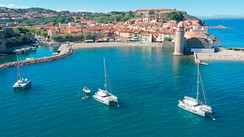
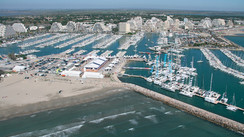
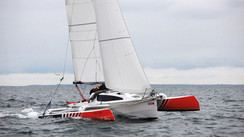
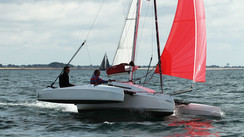
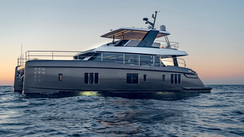
What readers think
Post a comment
No comments to show.